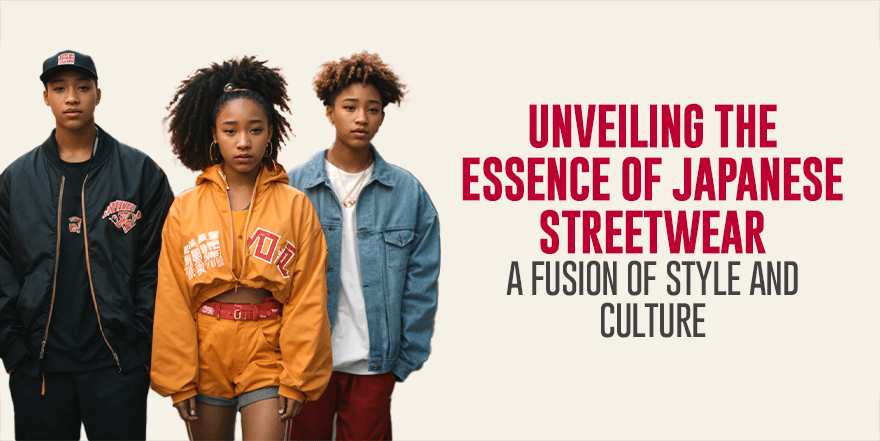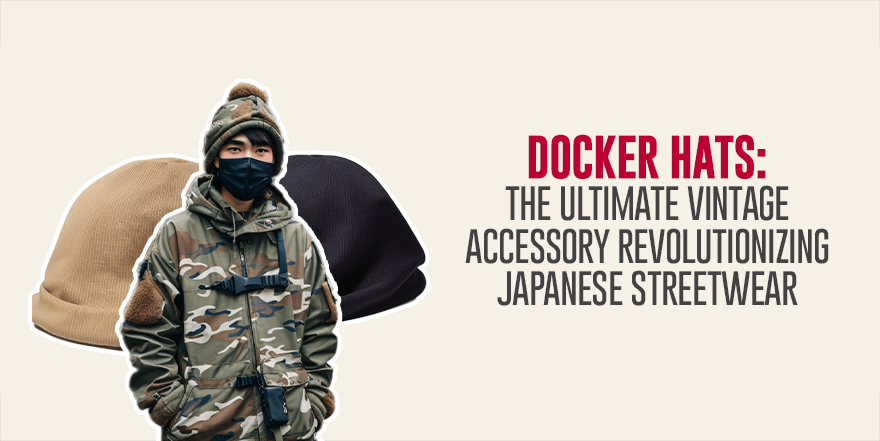Your Cart is Empty
It's no secret that fashion has changed drastically in recent years. Even an inexperienced eye realizes the huge transition the industry has undergone. The phenomenon behind this upheaval is of course streetwear.
Urban culture is invading every aspect of modern fashion. Born out of a deep-seated need for the street and propelled by the biggest celebrities, street style is dominating the runway.
Don't know anything about streetwear? Love it, but don't know where it comes from? We give you a rundown on what you need to know about this revolutionary concept.
What does "streetwear" mean ? The translation is simply "what you wear in the street". However, you should not miss the deeper meaning of this word.

Intriguing and exciting at the same time, streetwear is a concept that many people have trouble understanding. This modern, casual style of clothing is the product of the imagination of talented young avant-garde designers.
Urban fashion is out of step with the traditional fashion system. It destroys all the chains imposed by the big brands and competes with the classic trends. Streetwear creates a whole new vision of what is in vogue.
After struggling to gain acceptance, dressing in streetwear is now the most stylish look available. Being streetwear is about being cool and comfortable in your body while meeting the current industry standards.
It's safe to say that everyone picks their outfit from the cult items of urban fashion. It's such a vast and diverse style of clothing that it manages to satisfy everyone, and everyone finds what they like. With its sharp design and top aesthetics, it's a must-have, whatever your preferences are.
As Virgil Abloh, one of the pillars of modern fashion, says: "Streetwear is an artistic movement. It's a way of doing things." It's absolutely absurd to reduce urban culture to a simple fashion wave that will go away as quickly as it took hold.

Even if we don't always agree on the definition of streetwear, we have to admit that it extends far beyond the reign of designers. You can't limit an entire culture to a raw product!
Streetwear is a popular movement that shines through the dreams and aspirations of young people. It is a means of expression that springs from the street, from the deep needs of social classes to stand out in the four corners of the world.
In the street, individuality merges with belonging to a group. The exchange of energies and the sharing of values are what makes streetwear strong and popular.
Streetwear tells a story. The story of the street that goes wild and claims its share in an artistic and refined way. Fashionable clothing is only a form of expression to pass a message that runs in the blood. A deep desire to modernize mentalities while remaining faithful to its origins.
The street attitude is a way of life, a passion that animates a youth in search of independence.
To summarize, streetwear is style, but also comfort, exclusivity and community membership. An entity detached from classic fashion, but forever tied to the principles of working-class neighborhoods.
The complexity of streetwear's origins is what makes it a reference in the fashion world today. Its trends bring together sportswear and music, combined with a touch of graphic expression specific to the street.
To know the history of streetwear is to understand why it is so popular today.
Streetwear has its roots in hip-hop, rasta style and the trends of surfers and skaters of the 80s and 90s. Rocked by the rap music of the time, it's an independent clothing genre that rushed to the streets first. Urban fashion is also inspired by other influential movements of the time. We feel thin traces of rock, punk and grunge in their creations.

It is tempting to believe that streetwear has suddenly become part of the fashion world, but this is not quite the case. It mainly complements contemporary street art in New York and California. It wasn't until much later that it was appreciated and then broke through elsewhere.
This trend was born in the street, in small households where it was not possible to afford designer clothes. We mustn't forget that Hip-Hop fashion quickly became unaffordable for families with modest incomes. The working class neighborhoods let their creativity guide the design of their clothes. The non profit character is what makes it an authentic movement and completely independent from the high fashion influences of the moment.
Several legendary figures have marked the very beginning of streetwear. When the concept started to materialize, some designers wanted to contribute to the establishment of the laws of urban culture.
As unprecedented and unexpected as it may seem to you, it was a surfboard designer who improvised the first printed T-shirts. Shawn Stussy just took the graffiti from his longboards and put it on his tops. His business was so successful, his brand still exists to this day. Stüssy is considered a streetwear fundamental.
Many other independent designers were fulfilling street orders as the concept developed. Alongside these individuals, emerging brands emerged to support this new branch of fashion. According to Alyasha Owerka-Moore, streetwear is "any brand that emerges independently without external support".
It was around this time that Supreme was born. Far from being as popular as it is today, its beginnings were modest, but its style very distinctive. Nike, the most popular sportswear brand of the moment, also contributed to the genesis of street style. The sneaker trend was the main footwear asset of the 90s. Timberland, Calvin Klein or Tommy Hilfiger are also references of the ready-to-wear that represent the streetwear.
Don't think that streetwear was specific to the West! Asian countries have made it the emblem of their youth since its first appearances. Designers like Nigo and Hiroshi Fujiwara have popularized it on a huge scale.
This is the main reason why Japanese streetwear trends are neat, sophisticated and revolutionary. For example, the Japanese luxury urban brand, A Bathing Ape (which you probably know as Bape), offers very high quality products.
As the new era approached, a more sober, minimalist and classic style took over. Many thought that streetwear had disappeared so subtly, but it is safe to say that it has not said its last word. Following this brief loss of sight, streetwear has seen a huge resurgence in recent years.

What gave it a global dimension this time is the contribution of major brands. The first to adopt streetwear were Gucci and Blueberry. The aesthetic has been revised, and streetwear reinvented. It has been rediscovered in a whole new light. The addition of noble materials and elegant designs has maximized the impact of this style of clothing.
The first big comeback for streetwear was the Supreme × Louis Vuitton collaboration. The 10 most influential designers of the last 10 years say it was a major turning point. It was the element that triggered the streetwear avalanche: this style has never been absent from Paris fashion shows again. At Dior, Gucci, Balenciaga and Nike, it's the focus of chic collections and inspires the extravagant and eccentric designs we know today.
The other factor that has boosted modern streetwear is social networking. Ambassadors of urban culture are becoming numerous on the web, and perpetuate the original spirit of street fashion. It's the new way to share trends, and to assert one's urban identity.
All these elements make streetwear the most original, mainstream and symbolic clothing style of the moment.
The rappers of the 90's quickly succumbed to the charm of streetwear. Indeed, the differences between East and West coast were left aside on this point. Tupac, Snoop Dogg and The Notorious B.I.G. all welcomed this style of clothing with open arms.
This legacy passed down through the generations is still seen in our contemporary rappers. Jay Z, Eminem, Drake and Kanye West proudly wear streetwear. The latter's partnership with Adidas, Yeezy, is designed for urban fashion lovers.
Other music personalities, especially pop personalities, also love it. Justin Bieber, Billie Eilish and Ariana Grande love loose-fitting ensembles and own the most stylish sneakers.
Women's streetwear is a hit with supermodels. We admire the athleisure look of Gigi Hadid and Kendall Jenner on the catwalk and on their social networks.
The urban style is adapted to all body types, to the four seasons and it is dedicated to both sexes. Nevertheless, learning how to wear streetwear is not to be taken lightly: it is quite an art! Assembling T-shirts, hoodies, hats, sneakers and sweatshirts is very delicate.
To achieve your streetwear look, you must :
Are you in need of inspiration? Are you looking for the latest in streetwear? We invite you to visit our streetwear shop TENSHI™. Our urban fashion collections feature the hottest clothes and accessories of the moment.
We provide you with top of the line items to take your streetwear look to a whole new level. Influenced by Asian urban culture, we aim to bring you rare gems to proudly display your vision of fashion. Innovation, originality and authenticity are our highest priorities. Don't hesitate to take a look!
Comments will be approved before showing up.
By Credit & Debit Cards, Paypal or Apple Pay
For all orders over $100
We're available 7 days a week
Reply within 24 hours
Not loving it?
Free return within 30 days


